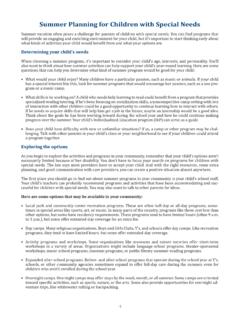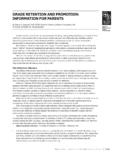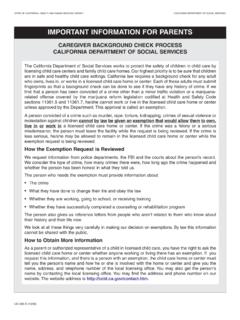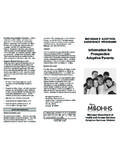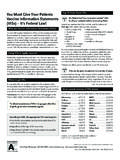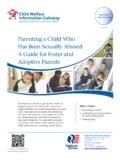Transcription of A Parent’s Guide to Special Education - Home | FCSN
1 A Parent s Guide toSpecial EducationA JOINT PUBLICATION OFThe Federation for Children with Special Needs andThe Massachusetts Department of EducationA Parent s Guide toSpecial EducationA JOINT PUBLICATION OFThe Federation for Children with Special Needs andThe Massachusetts Department of EducationThis information is copyright free. Readers are encouraged to copy and share it, but please credit the co-publishers,the Federation for Children with Special Needs and the Massachusetts Department of Education . AcknowledgmentsThe Parent information Project is a statewide training and information dissemination projectlocated at the Federation for Children with Special Needs (FCSN) and funded by theMassachusetts Department of Education , Office of Special Services. The intent of the project isto enhance the involvement of parents of children with Special needs in their children s educa-tion, development, and transition to adult life. The Federation for Children with Special Needs is a nonprofit organization based on thephilosophy of parents helping parents.
2 Founded in 1974 as a coalition of twelve disability andparent organizations, today the Federation is an independent advocacy organization committedto quality Education and health care for all, and to protecting the rights of children. To this end,the Federation provides information , support and assistance to the parents of children withdisabilities, their organizations, their professional partners, and their communities. The Massachusetts Department of Education and the Federation for Children with SpecialNeeds have worked collaboratively to create a product that will serve parents well in their needto gather information regarding Special Education services. The two agencies do not necessarilyagree on all policy interpretations; however, we do agree that it is important for parents to havethe most accurate and up-to-date information available, in order that they may work as equalpartners with their school system in Special Education Parent information Project would like to acknowledge K.
3 Nummi Nummerdor, MargaretMarotta Smith, Richard Robison, Marty Mittnacht, Katherine Honey, and Kristen McIntosh fortheir ongoing support and assistance in the publication of this Parent:If you are reading A Parent s Guide to Special Education , you probably have some concernsabout how your child is doing in school. You may be wondering if your child has a disabilityand needs Special Education , or, you already know that he or she needs Special Education andyou want to know more about the Special Education process. The purpose of this Guide is toexplain the Special Education process so that, if your son or daughter does receive Special edu-cation services, you can work effectively with the school as a member of your child s specialeducation Education is meant to meet the unique needs of a child that result from a disability, andto assure that students with disabilities receive all needed aids and services. Special educationlaws and regulations are meant to protect a student with disabilities and ensure that he or she getsthe services and assistance that may be necessary to make effective progress.
4 The laws and regu-lations are also very complex. We hope this Guide will be helpful to you in understanding the keyconcepts of the law and how to be an effective participant in the Special Education process. For over twenty-five years, the Federation for Children with Special Needs (Federation) hasbeen a parent-run organization providing training and technical assistance to families of chil-dren with Special needs. The Massachusetts Department of Education (DOE) has oversightresponsibility for public schools and seeks to ensure effective and sound educational practicesfor students across the Commonwealth. In a collaborative effort, the DOE and the Federationhave developed A Parent s Guide to Special Education to provide information about the spe-cial Education process. Research, history, and experience tell us that when parents are activelyinvolved in their child s Education , the child does better in school. We hope this Guide will helpyou become an informed member of your child s Special Education team so that your child hasthe best possible opportunity to learn and enjoy ,Marcia MittnachtRichard J.
5 RobisonState Director of Special EducationExecutive DirectorMassachusetts Department of EducationFederation for Children with Special NeedsUnderstanding the Special Education Process OverviewIntroductionWhat are the key Special Education laws? Special Education Laws and PrinciplesWhat are the major principles of Special Education laws?Parent and Student Participation What role do parents play in the Special Education process?Does my child have the right to attend meetings or have avoice in the Special Education process?What is a Parent Advisory Council?Appropriate Evaluation What should I do if my child is having problems in school?My school wants to provide Instructional Supports before makinga referral for Special Education . What does this mean?How do I make a referral for a Special Education evaluation?What is a pre-evaluation conference?What should I expect as part of the evaluation process?Who can see the evaluation information ?How long will the evaluation process take?
6 What does the term Team mean?What is the role of the Team in determining eligibility for Special Education ?What is a three-year reevaluation? Is it required?Is reevaluation required if the district removes my child fromspecial Education ?What is an Independent Educational Evaluation ?Who pays for an independent evaluator?How is information from an IEE used?Individualized Education Program (IEP)How can I make sure that my concerns are part of the IEP process?Does the IEP determine the subjects and information my child will learn?A Parent s Guide to Special EducationTable ofContents(and FrequentlyAsked Questions)468889101010101111111212131313 141516161617181919205A Parent s Guide to Special EducationWhat if my child has Special needs in areas besides academics?How does the Team identify what should be done?Are there any Special considerations that should be addressed in the IEP?What are Annual Goals?What are Benchmarks? How are they different from Objectives?How will I know what services my child will receive?
7 What about the IEP and state and district-wide testing,for instance, the MCAS test?Why is it important to participate in MCAS testing?How will my child participate in MCAS?When do I receive a copy of the IEP?Once we ve developed the IEP, do services begin immediately?What if I don t agree with part or all of the proposed IEP?How will I know how my child is doing?How often will the IEP be reviewed?What is transition planning for older students?People tell me that Special Education is an entitlement butadult services are not. What does that mean?Free and Appropriate Education (FAPE)What does FAPE guarantee my child?Least Restrictive Environment (LRE)Who determines what is the least restrictive environment for my child?How is that determination made?Procedural SafeguardsWhat are some of the procedural safeguards?When do I get a copy of the Parent s Rights Brochure?Do my child s rights change with age?What is the age of majority ?Are there Special safeguards for students or familieswhose primary language is not English?
8 What if my child is not found eligible for Special Education ?What is a 504 Plan?What if I disagree with the school about what is right for my child?What will the State Department of Education do ifI disagree with the school-district?What does the Bureau of Special Education Appeals do?What happens to my child s educational services while theschool and I resolve our differences?ConclusionResources202121212 2222323242424252526262627272828282929303 030313131313233333435 Parent, professional orschool personnel identifieschild as possibly needingspecial Education andrelated servicesA Brief Overview for StudentsEligible for Special EducationBelow is a brief overview of how a student isfound eligible for Special Education , how theIEP is developed and implemented, and howprogress is 5schooldaysof receiptof a referral the districtmust notify the parent andseek consent to evaluatebefore any assessmentbeginsWithin 45schooldaysof parents consent the TeamdetermineseligibilityWithin 30schooldaysof parentalconsent credentialedtrained specialistsevaluate the childTeam finds childeligible for specialeducation and/orrelated servicesAt the IEP Meetingafter the IEP is writtenthe Team determinesPlacementThroughout theIEP period qualifiedprofessionals providespecial Education andrelated servicesAt least as often as theparents of non-disabledstudents receive written progressreports the school will measureprogress toward IEP goalsand report that progress toparents in writing7 Within 45schooldaysof theparents consent forevaluation the Teamwill develop and writean IEP for all eligiblestudentsWithin 30daysof receiptof the IEP the Parents consent to the IEPand placementAt leastannuallyTeamreviews andrewrites IEPAt leastevery
9 3yearsSchoolreevaluateschildIntroduction Students with disabilities can achieve great things in schoolwhen they receive the supports and services they require. Whilenot every child with a disability will require Special educationservices, every child whose disability affects their school progressis entitled to receive a free and appropriate public Education (FAPE) which meets their unique needs. In this era of schoolreform, it is expected that high standards will Guide the teachingof all students. A parent, teacher or other professional may refer a studentfor Special Education evaluation at any time by contactingthe school s principal or administrator of Special Education . If you are concerned that your child may have a disability thatis affecting his or her ability to make progress in school, youcan first speak with the classroom teacher. As you speak withthe teacher, explain your concerns and ask the teacher to sharehis or her concerns.
10 As part of your discussion, it may bedecided that classroom accommodations will be used toaddress concerns for a short period of time. If your child con-tinues to have difficulty with schoolwork, you may make areferral for a Special Education evaluation at any Education Laws and PrinciplesSpecial Education is specially designed instruction and relatedservices that meet the unique needs of an eligible student witha disability or a specific service need that is necessaryto allow the student with a disability to access the generalcurriculum. The purpose of Special Education is to allow thestudent to successfully develop his or her individual educa-tional potential. Along with providing services to the child, ifnecessary, services are provided to parents and to teachers forthe student to benefit from Special Education . Special educa-tion is provided by the school district at no cost to Massachusetts, the Special Education system is based on thefederal Special Education law, the Individuals with DisabilitiesEducation Act (IDEA), in combination with the state s specialeducation law (MGL c.)
